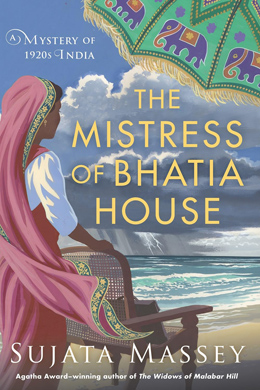Historical fiction is at its best when it can both educate the reader about the past and elucidate something about our present at the same time. This is a tricky balance, but Sujata Massey has made it look easy across the first three novels in her historical India series featuring Perveen Mistry. If anything, with the most recently released fourth book—The Mistress of Bhatia House—she seems to have leveled up on these skills all while also executing a very complex and successful mystery plot populated with characters readers have grown to love.
It would be impossible not to associate the Supreme Court’s recent decision to overturn the rights granted under Roe vs Wade with the plot of The Mistress of Bhatia House—so intwined and ingrained is the worldwide history of government control over women’s bodies. The core mystery of the novel—which then expands to multiple strands of different mysteries—is a new case Perveen has taken on involving a young servant girl named Sunanda who is accused of having an abortion. It’s the 1920s and as Bombay’s only female solicitor, the duty of protecting this particular woman—and the rights of all women—falls on Perveen’s shoulders.
Meanwhile, at home, Perveen’s sister-in-law (and friend) suffers from what would today be called postpartum depression. Her interactions with the family stun and concern everyone, as it seems so out of character for woman. The stress around the household is at an all-time high when Perveen decides that bringing Sunanda into the family compound is the only option. Complicating matters is the taboo and clandestine relationship Perveen is having with a man society views as totally inappropriate for her.
Whereas the earlier books in the series focused primarily on Perveen’s professional role, The Mistress of Bhatia House allows Sujata Massey to further explore this beloved character’s personal life. In many ways, the dynamic within the Mistry household is every bit as gripping as the methodically-crafted mystery elements at play in the plot.
The beauty of The Mistress of Bhatia House (and really Massey’s entire series) is how she refuses to portray India as a monolithic culture. Massey celebrates the vast diversity of people—particularly caste and religious differences—across the country and builds her mystery plots around the tension-filled interactions generated by these individualistic goals. This helps to bring each character’s personality and their motivations to the forefront resulting in a lush and intricate narrative.
Closing the pages of The Mistress of Bhatia House, readers will be forced to reflect on society’s treatment of women and the machinations in place which not only allowed that to happen, but which continue to plague us today. Sujata Massey’s ability to fold that so seamlessly into a truly entertaining mystery read is testament to her years honing her craft.
Readers who haven’t yet met Perveen Mistry can certainly start with this novel, but Sujata Massey’s entire series is worthy of attention, so going back to The Widows of Malabar Hill might make for a more robust reading experience.

BUY LINKS: The Mistress of Bhatia House by Sujata Massey
Disclaimer: A print galley of this title was provided to BOLO Books by the author. No promotion was promised and the above is an unbiased review of the novel.
